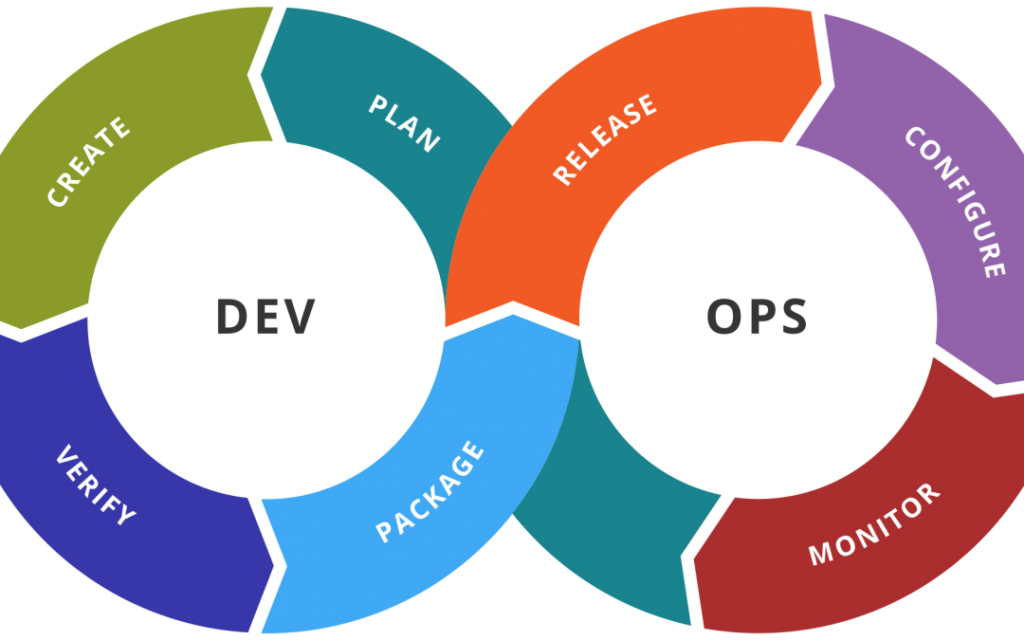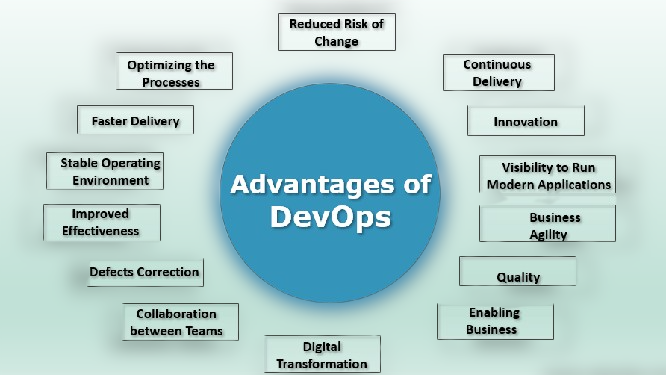
What is DevOps?
DevOps is a software development methodology that combines software development (Dev) and IT operations (Ops) to improve collaboration, efficiency, and quality in the software development lifecycle.
Why We need DevOps?
We need DevOps because it allows organizations to deliver software faster and more reliably. By combining development and operations teams, organizations can automate processes, streamline workflows, and increase the speed of software delivery.
What is the Advantage of DevOps?

The advantages of DevOps include:
- Increased collaboration and communication: DevOps promotes collaboration and communication between development teams, operations teams, and other stakeholders. This results in better alignment, shared goals, and faster resolution of issues.
- Continuous delivery and faster time to market: DevOps enables teams to automate various stages of the software delivery process, such as building, testing, and deploying. This automation leads to faster, more frequent and reliable releases, ultimately reducing time to market.
- Improved quality and stability: Continuous integration, automated testing, and deployment pipelines ensure that software changes are thoroughly tested and validated. This leads to higher quality releases with fewer bugs and reduces the risk of system failures.
- Increased scalability and efficiency: DevOps practices emphasize scalability and efficiency by leveraging automation, infrastructure-as-code, and containerization. This allows for easier provisioning and scaling of resources to meet changing demands, ultimately optimizing resource utilization.
- Enhanced customer satisfaction: DevOps focuses on delivering value to customers by rapidly responding to their needs and incorporating their feedback into new releases. This customer-centric approach improves satisfaction and loyalty.
- Better risk management: DevOps practices encourage monitoring, logging, and continuous feedback loops, which enable teams to identify and resolve issues quickly. This proactive approach minimizes the impact of failures and reduces downtime.
- Empowered and more motivated teams: DevOps eliminates silos and encourages cross-functional collaboration, empowering team members to contribute to different stages of the software lifecycle. This autonomy and shared responsibility result in higher engagement, motivation, and job satisfaction.
What is the feature of DevOps?

The key features of DevOps include:
- Continuous Integration (CI): DevOps emphasizes the practice of integrating code changes frequently and automatically, allowing teams to detect issues early.
- Continuous Delivery (CD): DevOps promotes the idea of delivering software updates frequently and reliably, ensuring that new features and bug fixes reach users quickly.
- Infrastructure as Code (IaC): DevOps encourages the use of code to manage and provision infrastructure, making it easier to replicate environments and reduce manual efforts.
- Automated Testing: DevOps advocates for the automation of testing processes, enabling teams to identify and fix issues quickly and efficiently.
Top 10 Use Cases of DevOps
- Continuous Deployment: DevOps enables organizations to continuously deploy code changes to production, reducing the time between development and deployment.
- Infrastructure Automation: DevOps allows for the automation of infrastructure provisioning and management, making it easier to scale and manage resources.
- Continuous Monitoring: DevOps promotes continuous monitoring of applications and infrastructure, allowing teams to identify and address issues in real-time.
- Microservices Architecture: DevOps is well-suited for organizations adopting a microservices architecture, as it enables teams to deploy and manage individual services independently.
- Agile Development: DevOps aligns well with agile development methodologies, as it encourages collaboration, frequent feedback, and continuous improvement.
- Release Management: DevOps helps organizations streamline the release management process, allowing for faster and more reliable software releases.
- Cloud Migration: DevOps can facilitate the migration of applications and infrastructure to the cloud, enabling organizations to take advantage of cloud services and scalability.
- Security and Compliance: DevOps incorporates security and compliance practices into the development process, ensuring that applications meet the necessary standards.
- Containerization: DevOps supports the use of containerization technologies like Docker, making it easier to deploy and manage applications across different environments.
- DevSecOps: DevOps can be extended to include security practices, resulting in DevSecOps, which integrates security into every stage of the software development lifecycle.
How to Implement DevOps?
To implement DevOps, organizations can follow these steps:
- Assess the current state: Understand the existing development and operations processes, identify pain points, and define objectives for the DevOps implementation.
- Build a DevOps team: Assemble a cross-functional team with members from development, operations, and other relevant departments to drive the implementation.
- Define processes and tools: Establish the processes and tools needed for collaboration, automation, and monitoring. This may include version control systems, continuous integration and delivery tools, and infrastructure management platforms.
- Automate processes: Identify opportunities for automation and implement tools and technologies that can automate tasks such as code deployment, testing, and infrastructure provisioning.
- Foster collaboration: Encourage communication and collaboration between development and operations teams to break down silos and promote shared responsibility.
- Measure and improve: Define metrics and key performance indicators (KPIs) to track the success of the DevOps implementation. Continuously monitor and analyze data to identify areas for improvement.
How to Get Certified in DevOps?
There are a number of certifications available for DevOps professionals. Some of the most popular certifications include:
- DevOps Engineer – Certified Professional (DevOps CERT): This certification is offered by the DevOps Institute and is designed for professionals with experience in DevOps. The exam covers a wide range of topics, including continuous integration and continuous delivery (CI/CD), infrastructure as code (IaC), and cloud computing.

- Certified DevOps Engineer – Associate (CDevOps-A): This certification is offered by the Linux Foundation and is designed for professionals with a basic understanding of DevOps. The exam covers topics such as automation, communication, and collaboration.

- Certified DevOps Engineer – Expert (CDevOps-E): This certification is also offered by the Linux Foundation and is designed for professionals with experience in DevOps. The exam covers a more advanced level of topics, such as security and compliance.

- Certified Kubernetes Administrator (CKA): This certification is offered by the Cloud Native Computing Foundation and is designed for professionals who want to manage Kubernetes clusters. The exam covers topics such as cluster administration, networking, and security.

- Certified Kubernetes Application Developer (CKAD): This certification is also offered by the Cloud Native Computing Foundation and is designed for professionals who want to develop applications for Kubernetes. The exam covers topics such as application development, deployment, and monitoring.

The best certification for you will depend on your experience level and career goals. If you are new to DevOps, then the CDevOps-A certification is a good place to start. If you have more experience, then the CDevOps-E certification or the CKA certification may be a better fit.
To become certified, you will need to take and pass an exam. The exams are typically offered online and are proctored. The cost of the exams varies depending on the certification.
To get certified in DevOps, Visit most popular website for providing DevOps certification Courses .
– DevOpsSchool.com
– scmGalaxy.com
– BestDevOps.com
How to Learn DevOps?
There are a number of ways to learn DevOps. Some of the most popular ways include:
- Taking a course: There are a number of online and in-person courses available for DevOps professionals. Example- DevOpsSchool.com , scmGalaxy.com , BestDevOps.com
- Reading books: There are a number of books available on DevOps.
- Attending conferences: There are a number of conferences held each year that focus on DevOps.
- Joining a community: There are a number of online communities for DevOps professionals.
- Getting hands-on experience: The best way to learn DevOps is by getting hands-on experience. This can be done by volunteering for a DevOps project or by working for a company that uses DevOps practices.